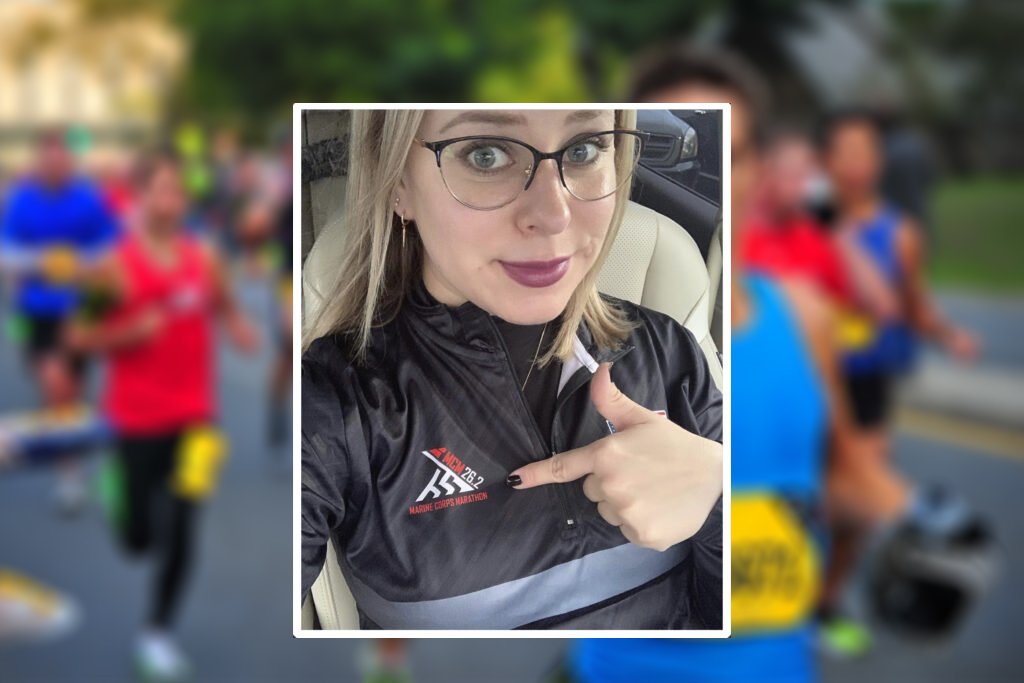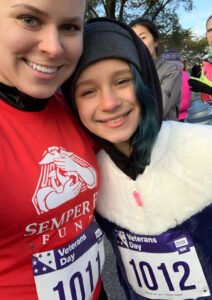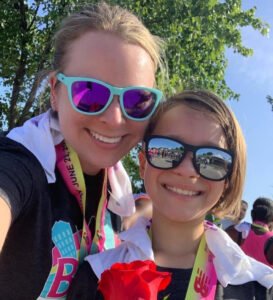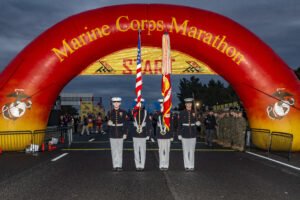Recovering from COVID-19: Marine Veteran Fights to Rebuild Body in Time for Marine Corps Marathon

The weekend before she was diagnosed with COVID-19, Mackenzie Wolf was sitting on her couch in her apartment in Ellicott City, Maryland, when the intense fatigue and lightheadedness got so bad she started seeing black spots.
“I remember sitting my daughter down, and I had her write down our address and how to get into the apartment,” said the 32-year-old single mom and U.S. Marine Corps veteran. “I said, ‘If I pass out, you need to call 911.’ I had to instruct her on how to call an ambulance for me and tell them what was going on. It’s not an experience I want any young child to have to go through.”
It was the second week of April when Wolf, an avid long-distance runner, started feeling unwell. She and her 11-year-old daughter, Madelynn, had been quarantined in their apartment for weeks.

“I just started feeling very, very tired, just constantly exhausted,” she said. “I was sleeping probably like 12 hours a day with no reason to because we’re not exactly very active during quarantine. Then I started coughing, and over the next week and a half, I just got progressively worse.”
When her breathing became labored and painful and she started running a fever, Wolf knew something was very wrong. But when she called her doctor and reported her symptoms, she was asked not to come in for fear of infecting others.
“No one would see me at that time unless it was an emergency room, but if I didn’t have COVID, I could possibly expose myself to it in that environment,” she said. “And as a single parent, should I tote my 11-year-old along with me? My biggest fear was getting her sick.”
That was the weekend Wolf got really sick and sat Madelynn down to prepare for the worst.
“I was scared,” Madelynn said. “I didn’t want that to happen. I was worried that I would start freaking out and then I’d kind of just be frozen in place not knowing what to do.”

That Sunday, Wolf called an emergency nurse line and got connected to an on-call physician. The doctor wouldn’t prescribe her anything without seeing her, but they scheduled her for a COVID-19 test the following day.
“I still didn’t think I had COVID because what I’ve read is one of the markers for COVID is a very high fever,” Wolf said. “I didn’t have the crazy body aches, the fever — nothing like that. It was just coughing, shortness of breath, and painful breathing. I described my symptoms to a friend who was an Army medic, and she was like, ‘You need to see the doctor now.’”
That Monday, she tested positive for COVID-19.
“I still have no idea how I actually caught it,” Wolf said. “I’ve been really good about social distancing. For that first six weeks, we did not leave the house. My best guess is I got it when I went to the grocery store to pick up my daughter’s birthday cake. Because that’s really the only time I’d been out for something non-essential.”

Wolf said she was “actively sick” for about three weeks, and even now — almost two months from when she first fell ill — she’s still dealing with a regular cough and the residual effects of the virus.
“I’ve been healthy all my adult life, but now I have an inhaler I have to use. I get winded walking around my house,” she said. “I’m exhausted constantly, and my primary care physician said the coughing and the damage to my lungs could take months to go back to its baseline.”
Despite all of that, Wolf stubbornly refused to let COVID-19 derail her 2020 goal of completing the Semper Fi Challenge, which requires runners to complete the Marine Corps Historic Half marathon and the Marine Corps Marathon. The half marathon, which officials converted to a virtual event, was scheduled for May 17, which was about a week after Wolf’s “actively sick” phase.
“It was not my wisest decision,” she said as her daughter laughed at the admission. “I ran isolated in my neighborhood, and I immediately regretted the decision. I had been fever-free for a few days at that point, and that night I spiked a fever again. I probably set myself back a week, all because of my stubbornness and not wanting to get kicked out of this particular thing that I signed up for.”
“I think at a point, we all have to learn to put ego aside and just sort of accept where things presently are and not where we would like them to be.”
Wolf, who also lives with the neurological disease multiple sclerosis, said she normally runs about a 9-minute mile for long-distance events. For the half marathon, she said she ran 14-minute miles.
“More like I shuffled for 13 miles,” she said.
Wolf served in the Marine Corps from 2006 to 2011 as a Persian Farsi linguist with 1st Radio Battalion at Camp Pendleton; now she works for a veteran service organization. She said recovering from COVID-19 has been a very humbling experience that has forced her to look at her stereotypical Marine mindset in a different light.
“The stubbornness and ego that kind of come with being a Marine — I feel like that stubbornness made me put myself at an unnecessary risk,” she said. “I should not have run that half marathon. I think at a point, we all have to learn to put ego aside and just sort of accept where things presently are and not where we would like them to be. And I need to be better about that as an individual.”

So is she going to skip the Marine Corps Marathon in October?
Of course not.
She already suffered through the miserable first half of the Semper Fi Challenge, and she has several months to train her body back to health. So she’s taking things slow and listening to her body as she works toward a full recovery.
“Now that it’s hotter and humid, running — or trying to — has been a joy,” she said sarcastically. “My warm-ups to my runs now require cool downs by themselves. I’ve cut my distances dramatically. I basically started myself off at square one of half-marathon training.”
For now, Wolf’s confident that she’ll be ready for the big race in October. Her biggest concern is that it will transition to being a virtual event.
“Because running 26 miles by myself sounds awful,” she said.
But if she has to, she will. Because Mackenzie Wolf is a Marine.

Ethan E. Rocke is a contributor and former senior editor for Coffee or Die Magazine, a New York Times bestselling author, and award-winning photographer and filmmaker. He is a veteran of the US Army and Marine Corps. His work has been published in Maxim Magazine, American Legion Magazine, and many others. He is co-author of The Last Punisher: A SEAL Team THREE Sniper’s True Account of the Battle of Ramadi.
BRCC and Bad Moon Print Press team up for an exclusive, limited-edition T-shirt design!
BRCC partners with Team Room Design for an exclusive T-shirt release!
Thirty Seconds Out has partnered with BRCC for an exclusive shirt design invoking the God of Winter.
Lucas O'Hara of Grizzly Forge has teamed up with BRCC for a badass, exclusive Shirt Club T-shirt design featuring his most popular knife and tiomahawk.
Coffee or Die sits down with one of the graphic designers behind Black Rifle Coffee's signature look and vibe.
Biden will award the Medal of Honor to a Vietnam War Army helicopter pilot who risked his life to save a reconnaissance team from almost certain death.
Ever wonder how much Jack Mandaville would f*ck sh*t up if he went back in time? The American Revolution didn't even see him coming.
A nearly 200-year-old West Point time capsule that at first appeared to yield little more than dust contains hidden treasure, the US Military Academy said.












